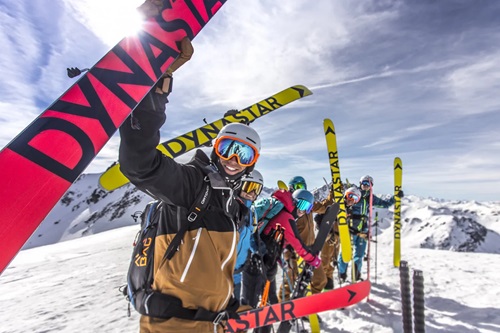As Dynastar celebrates its 60th anniversary, the brand based at Mont Blanc in the French Alps, has its sights set on high-end ski performance while carving a more sustainable path forward for the ski industry.
New for Fall/Winter 23-24, Dynastar’s Hybrid Core 2.0 ski construction is a key part of its sustainability journey. Hybrid Core 2.0 improves on the benchmark ski ability that has cemented Dynastar’s reputation while reducing environmental impact across six key indicators: environmental acidification, greenhouse gas emissions, freshwater use, particulate matter, material and mineral use and fossil fuel consumption.
A life cycle analysis conducted by AIR Coop, a global network of brands that was founded to help inform and improve the social and environmental impact of production, showed the main contributor to environmental impact was material consumption during the ski-production process.
To reduce the quantity of environmentally unfriendly materials in the ski while improving the brand’s unique ski ability, Dynastar developed a wood layer design (placed in three directions instead of just one: longitudinally, vertically, and transversally), which replaces the mechanical properties provided by composite materials such as glued fiberglass.
The result: a significant reduction in all six environmental indicators that will help reduce emissions by a total of 120 tons from the production of skis while maintaining equivalent or improved performance on the slopes.
As a result of Hybrid Core 2.0’s development, 45 percent of Dynastar’s annual volumes will be eco-designed by the winter of 2025-2026.
“The mountains that inspire our passions and occupy our leisure time are suffering directly from global warming. And it is not just our own playground but the entire natural ecosystem that is threatened,” said Dynastar Brand Manager Laurent Richard.
“In our view, there is no future for skiing unless it is conceived of in a more responsible way. It is our duty to find solutions to reduce our industry’s impact on the environment,” Richard continued. “With Hybrid Core 2.0, a door is opening into the world of eco-design, which will be at the heart of all our future product plans.”
For the 2023-2024 winter season, the Hybrid Core 2.0 technology will be integrated into the M-CROSS, E-CROSS, M-TOUR and E-TOUR ranges, representing 13 percent of total production, rising to 23 percent by the winter of 2024-2025.
In three years, the brand’s objective is to achieve almost 45 percent eco-designed production of annual volumes. The skis will be manufactured in Sallanches, the heart of the Alps.
Dynastar and the Rossignol Group will place their environmental and social commitments at the heart of all its major strategic initiatives. To learn more, visit Dynastar.com








